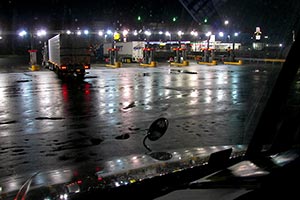Diesel Average Declines 0.7¢ to $2.382 a Gallon

The U.S. average retail price of diesel dipped 0.7 cent to $2.382 a gallon, according to the Department of Energy as oil prices hovered around $45.
Diesel is 9.4 cents cheaper than it was a year ago, when the price was $2.476, DOE said after its Sept. 26 survey of fueling stations.
Trucking’s main fuel was down in every region expect for three: the East Coast, the Central Atlantic and Lower Atlantic areas.
Crude oil futures on the New York Mercantile Exchange closed Sept. 26 at $45.65 per barrel. That was up from $44.38 on Sept. 23.
Meanwhile, the U.S. regular gasoline average price fell 0.1 cent to $2.224 a gallon, 9.4 cents cheaper than a year ago, DOE’s Energy Information Administration reported.
Regional gasoline prices were mixed: falling in three areas, and rising in five.
Regardless of the direction of fuel prices, the amount of work to manage the required state tax reporting is the same, said Michelle Harry, director of marketing, Paccar Leasing Co.
“Fuel prices are what they are. You are going to have to file your fuel tax no matter what the price,” Harry said. “So what we offer are the products and processes that will simplify that as much as we can and alleviate some of that burden. Then we build the cost of doing that into the monthly [lease] rate.”
PacLease has a co-branded fuel card with Comdata Inc. that, among other features, allows fueling transactions in the Comdata system at the customer’s request to automatically be sent to PacLease and its fuel tax department.
If the lease customer has PacTrac, Paccar’s telematics service, powered by PeopleNet, it will gather the truck’s route information to supplement information on fuel purchases.
PacLease is a unit of Bellevue, Washington-based Paccar Inc., the parent company of truck brands Kenworth Truck Co. and Peterbilt Motors Co.
Fuel card provider Comdata is based in Brentwood, Tennessee. Fleet management solutions provider PeopleNet is based in Minnetonka, Minnesota
Meanwhile, OPEC’s decision to hold informal talks in Algiers this week has fanned speculation that the group might be about to deviate from a two-year-old policy of pumping without limits, which succeeded in hurting rival suppliers but also sent prices into free fall, Bloomberg News reported.
A previous attempt to agree on an output freeze, including non-OPEC member Russia, collapsed in Doha in April when Saudi Arabia walked away because Iran refused to participate. This time around, many producers also have conflicting priorities, with Iran, Iraq and Nigeria determined to restore lost production, while Russia and Saudi Arabia maintain near-record supplies, Bloomberg said.
U.S. average #Diesel fuel price on 9/26/16 = $2.382/gallon, DOWN $0.007/gallon from week ago https://t.co/i7RLzWymC1 #truckers pic.twitter.com/eKmoZtmT1o — EIA (@EIAgov) September 26, 2016




